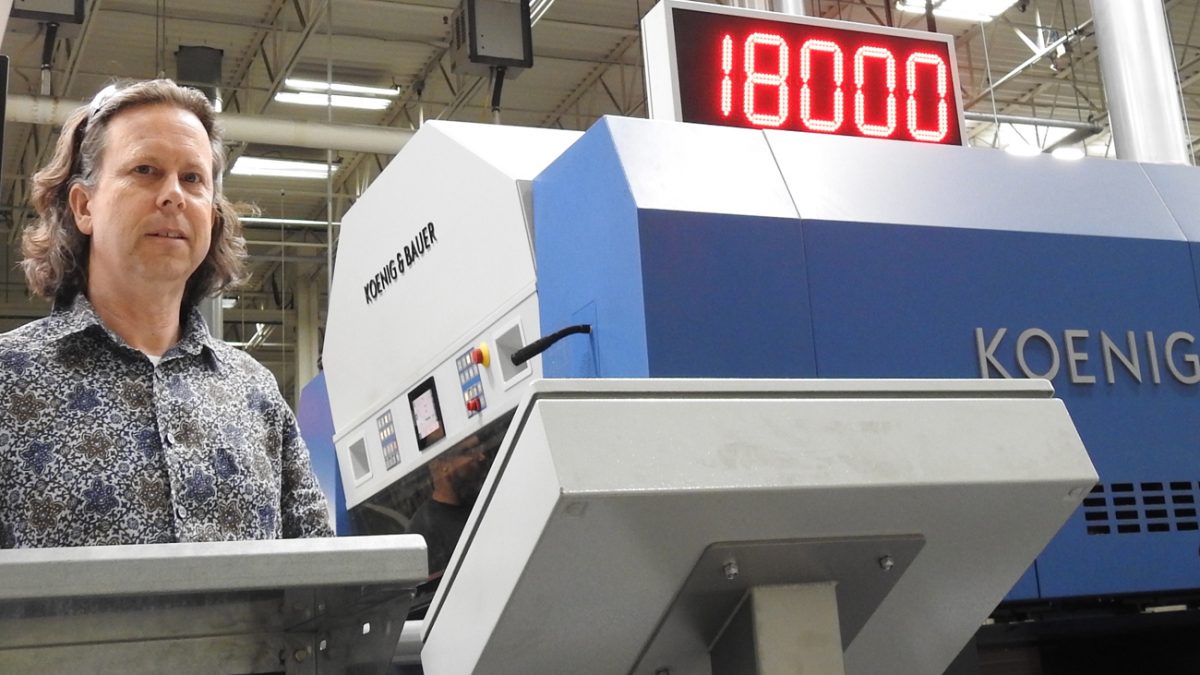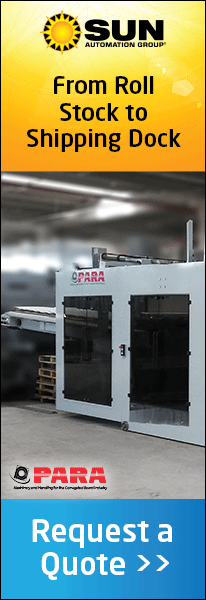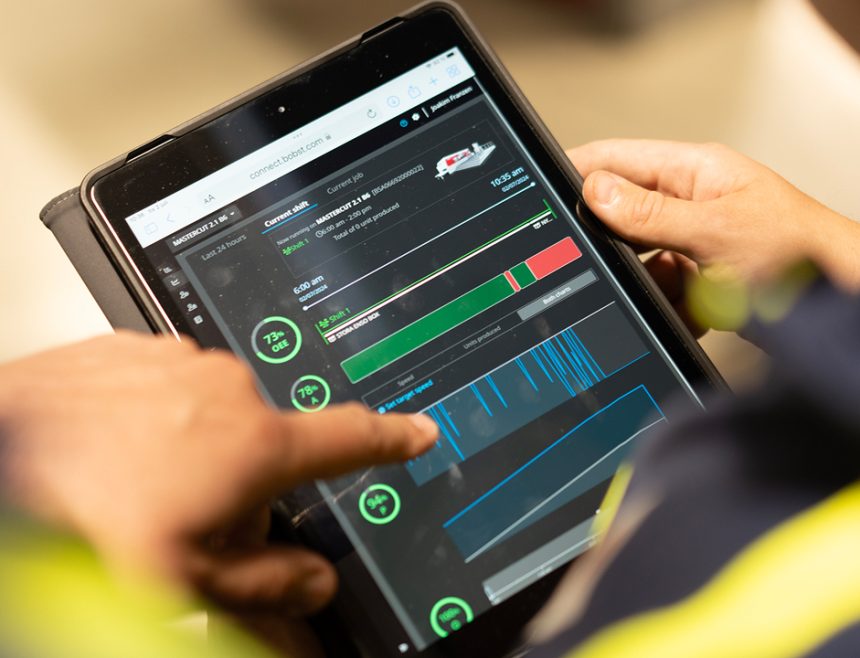An article by Len Prazych.
According to one member of the company’s fourth-generation, Tom Zumbiel III, ‘Legend has it’ that the earliest iteration of Zumbiel Packaging was founded in 1843 by a gentleman named C.W. Jordan. Zumbiel’s great grandfather, Charles Zumbiel, was Jordan’s plant superintendent. When Jordan died in 1876, Zumbiel purchased the plant and the business from Jordan’s widow. Jordan’s work was in dry goods, and he needed boxes to put those items in. When Zumbiel took over, customers continued asking for boxes for their goods but specifically, they were asking for hat boxes. Since it was the 1870s and virtually every man and woman wore a hat, Zumbiel delivered what his customers wanted.
In addition to its new owner Charles, the 1876 version of Zumbiel Packaging had five employees who worked in a small warehouse between 2nd and 3rd Streets in downtown Cincinnati. When the Ohio River flooded in 1937, the company moved ‘up the hill’ to higher ground in nearby Norwood, a Cincinnati enclave. Nearly 150 years and four generations later, Zumbiel Packaging still stands, only now it’s on ‘high ground’ across the Ohio River in Hebron, Kentucky, where it has risen to become one of the largest independent suppliers of multi-pack beverage cartons in the United States. It counts many major CPG companies as satisfied customers for decades.
Responding to customers’ 20th century demands, Zumbiel Packaging began manufacturing folding cartons and rigid boxes, shirt boxes and confectionery boxes and boxes for the automotive industry. The company was never in the corrugated business.
In the mid-1960s, Tom Zumbiel’s grandfather, Robert Zumbiel and his brother, Charles, received a call from International Paper saying they needed beverage basket carriers. A lot of them. This evolved into 12-packs and from there the business took off. Zumbiel Packaging opened a second facility in the late 1960s and set up its beverage business, devoted solely to the manufacturing of 12-packs, 24-packs, and basket carriers. This facility was eventually consolidated into the Hebron facility in 2012, creating the 500,000 sq ft super-plant where about 350 employees enjoy careers.
Employees Make The Difference
“Customer service is so incredibly important around here and everyone in the industry knows it is difficult to get a new customer and it’s very difficult to keep a customer,” says Zumbiel. “But our story is not all about finding the next market and growing again. The Zumbiel story is really about the people who work here. Our people have been employees for an average of 18 years – several of them have been here between 30 and 40 years – and I think this says it all.”
 One of those employees is Mark Barton, VP of Manufacturing (pictured left), who’s been with Zumbiel Packaging for more than 30 years and according to Tom Zumbiel, “is the guy who takes care of all of it,” referring to the company’s massive production facility in Hebron. Formerly manager of Zumbiel’s sheet-fed plant in Norwood, Barton has been overseeing the installation of machinery in Hebron since 2004 and managed the logistical challenges of the company’s plant consolidations in 2012.
One of those employees is Mark Barton, VP of Manufacturing (pictured left), who’s been with Zumbiel Packaging for more than 30 years and according to Tom Zumbiel, “is the guy who takes care of all of it,” referring to the company’s massive production facility in Hebron. Formerly manager of Zumbiel’s sheet-fed plant in Norwood, Barton has been overseeing the installation of machinery in Hebron since 2004 and managed the logistical challenges of the company’s plant consolidations in 2012.
“Once we get our foot in the door with a customer and they see what we can do, we’ll usually get additional work,” says Barton. “We’re aware there’s a market price and service only goes so far, but our core competency is really understanding what the customer needs then figuring out what we have to do to satisfy that need.”
Zumbiel adds, “Ultimately, we like to say that the last thing we sell is a box. We sell solutions. We’re as good at structural design as anyone in the world and we have some of the fastest sample turnarounds in the industry.”
Zumbiel, who has been in the family business for more than 30 years, says he has no official title but Marketing Director will suffice. His role indeed encompasses marketing, but it also includes the areas of sustainability and innovation. And after three decades, he still relishes the opportunity to visit a customer in person to discuss new ways to do a project.
For example, Zumbiel met with a customer that had never been in folding cartons before. The customer had been using plastic rings on their beverage packages. In 31 days, Zumbiel’s design team created 81 different structures, which often involved bringing samples up to the customer in the morning, discussing modifications, driving back to Zumbiel Packaging to make the requested changes, then driving back up to the customer’s plant the following morning with the next version of the design. The customer enjoyed folding carton success.
Zumbiel Packaging’s geography has its advantages. Cincinnati, Ohio, is within a 10-hour drive to 60% of its customers and they ship as far south as Miami and as far west as Seattle. It also ships into Canada.
Enter Koenig & Bauer. Again.
Staying competitive means the need for machinery that can deliver the speed, quality, and capacity to satisfy a thirsty nation. Last year, Zumbiel Packaging installed a new Koenig & Bauer Rapida 145 7-color large-format press, which can produce up to 18,000 sheets per hour, a perfect fit for the long runs Zumbiel churns out for its customers.
“You’ve got a camera, automatic plate changers, fast make readies, and about a dozen other things that make the Rapida 145 exactly the machine we count on for the mass quantities we produce,” says Zumbiel.

Leveraging the Rapida’s fast make-readies, Press Operator Roger Ayala ensures another high-speed run.
Adds Barton, “This is the fourth machine we’ve purchased from Koenig & Bauer, going back to the Planeta we bought in the 1980s, so we’re familiar with the company. But technology has improved greatly since then and we wanted to look at competing large-format machines, so we traveled to Germany and in ten days visited three manufacturers at their factories.
“We had a long list of technical questions for Koenig & Bauer’s people and even rented a meeting room at a nearby hotel so we would have time to discuss everything on our agenda. We started in the early afternoon and planned to finish by dinner. We still weren’t done, so we brought in food and ended up staying until 10:00pm. Koenig & Bauer’s people answered every technical question we had,” says Barton.
The majority of the board coming into Zumbiel’s Hebron plant runs on multiple presses: one is a wide web flexo press dedicated to 12-packs, the other presses change structures and dies depending on the product being run. “We really exist by making carriers for cans because cans are doing well,” says Zumbiel. “And they’re recyclable.”
The competition for its Zumbiel’s products include integrateds with a presence in the Cincinnati region, but no other independent can compare to Zumbiel’s sheer volume and capacity, which has only grown larger since the Koenig & Bauer came on line.
The Paperboard Solution
“The truth is, plastics are our biggest competitor,” says Zumbiel, citing the fact that plastics have been showing up as far away as the Fiji islands and Indonesia, only reinforcing the idea that a more ecologically sustainable solution is needed to help solve the Earth’s crisis. In fact, he continually speaks with organizations about their sustainability goals and how Zumbiel’s innovations can help achieve them, specifically, by helping them get out of plastics and into paperboard. “When you talk to a company about getting out of Styrofoam and getting them into something recyclable, you begin to see big opportunities, especially in the carry-out/take out market. And there’s always a market for convenience and personalization. It’s a windfall for us and for anyone else who makes something that’s recyclable and sustainable.”
Not surprisingly, Zumbiel Packaging did ‘very well’ during the pandemic, when people ordered a lot of restaurant take-out and ate a lot of frozen foods. But this is not to say the company doesn’t have its challenges.
The Employment Situation
Like most other companies in industry, Zumbiel Packaging has faced recruiting difficulties, most notably, hiring employees at entry-level positions. “It’s a challenge getting younger people to sign on,” says Barton. “We’re in a more ‘challenged’ part of the country because we have Amazon and its $2 bn expansion happening near Cincinnati/Northern Kentucky International Airport, a mere five minutes from Zumbiel Packaging’s plant, pulling people away from us. To our benefit though, once we have an employee, they stay with us, and our more senior people are not ‘turning over’ like they are at some other companies.”
“It’s all about how you treat people,” concludes Zumbiel. “That includes employees as well as customers. We want to be the place our employees want to work and the place we want customers to buy boxes from. But we’re not finished yet. There are ‘a whole lot of things’ on our capital agenda right now and we’re working on innovations that will compel customers to abandon plastic in favor of paperboard.”

Zumbiel Packaging’s Koenig & Bauer 7-color large format press can produce up to 18,000 sheets per hour.










